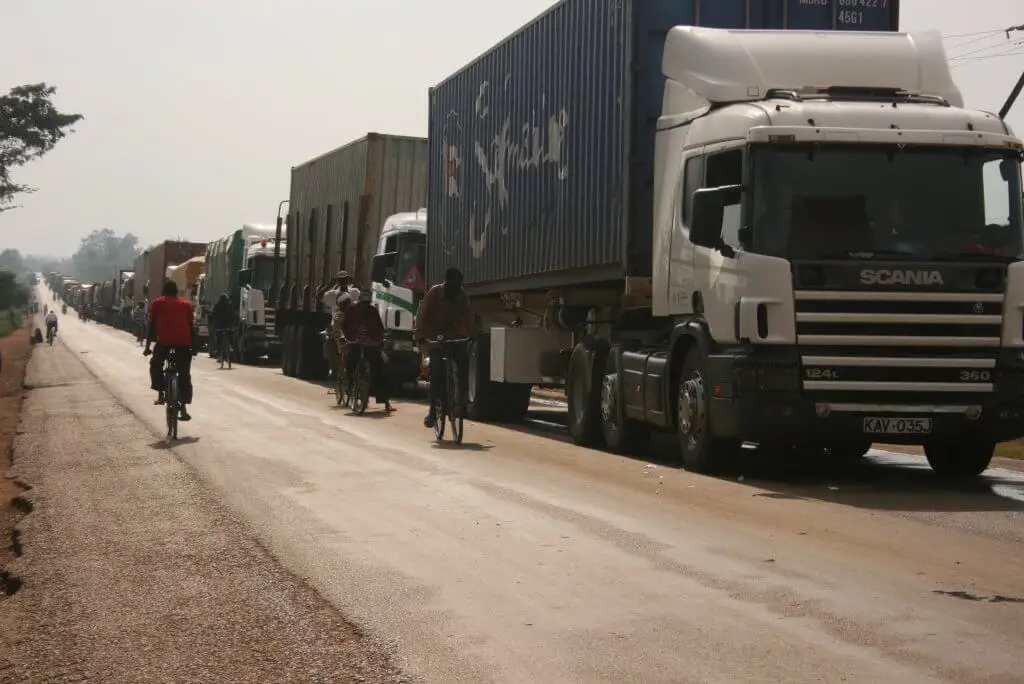Logistics industry stakeholders in the East African Community (EAC) have renewed push to contain further spread of the novel coronavirus by adopting containment measures, while ensuring that the region continues to get vital supplies and inputs through the Central and Northern transport corridors.
This follows emerging data that revealed that long distance truck drivers are a weak link in the fight against Covid-19 after several of them tested positive at various border crossing points.
With TMA’s support, The Federation of East African Freight Forwarders Associations (FEAFFA), the umbrella body of the region’s clearing agents has played a central role in the ongoing multi-agency efforts to tackle Covid-19 and enhance trade being employed in the region. Continuously, FEAFFA, Kenya Transporters Associations (KTA), Regional Lorry Drivers and Transporters Association (RLDTA), Transporters Association of Tanzania (TAT) and Tanzania Truck Owners Association (TATOA) held consultative meetings to develop recommendations which were presented to National Covid-19 Taskforces in the East Africa Community Partner States. This will inform the ongoing debate and shape the policy measures being pronounced.

The recommendations by the logistics representatives and players were guided by years’ of experience the agencies have on handling of cargo at various border crossing points. The basis of the recommendations was as follows:
- The agencies appreciated the plausible measures the EAC states pushed to adopt, for example deployment of relay driving where truck drivers swap with their counterparts in transit countries at the borders. And, drivers mandatory testing at borders. Additionally, the use of delivery of cargo to temporary ICDs at borders. To improve on this, the agencies multi-sectoral team made some suggestions. For example, they observed that transporters were experiencing challenge of getting equally competent truck drivers across borders due to lack of a harmonized Heavy Goods Vehicle (HGV) professional driver training. “The levels of exposure to various technologies is posing road safety and asset integrity challenges,” the team said in their petition. The team also highlighted to governments that small and medium sized transporters lacking capacity to mobilise resources to operate across the borders may be driven out of business.
- Further, they noted that relay driving will create difficulties in handling insurance claims related to the cargo and the trucks in case of any eventuality, uncertainty on the safety of the cargo, the trucks as well fuel due to involvement of multiple drivers.
- With TMA’s support FEAFFA has participated in ongoing campaigns for enhanced testing of truck drivers at the border points. This, the multi-sector team observed, can be enhanced through deployment of more medical personnel and equipment to minimize the time taken by truck drivers at borders.
- The multi-sectoral team urged EAC Partner States to fast track establishing a harmonised regional approach on testing and management of the truck drivers. For example, truck drivers can be tested at the start of their journeys and or at designated facilities along the corridors to facilitate easy passage through borders. The team also supports proposed cross-border Journey Management System.
- FEAFFA has been central in creating sensitisation to the industry players what is being done to contain the pandemic. It has effectively done this through regular updates through its online portal (www.magazine.feaffa.com) and other social media outlets. The portal has emerged as one of the leading platforms to disseminate logistics related information.
- Due to the ongoing crisis and delays occasioned by slow cargo take off from various entry points in complying with the measures in place, FEAFFA has been central in engaging ports, revenue authorities, regional transporters, Warehouse operators, associations and shipping lines to waiver charges during covid-19. To this effect, the Kenya Ports Authority (KPA) extended free cargo storage period to cushion shippers from the delays occasioned by Covid-19 pandemic. Domestic export containers enjoy a free storage period of 15 days compared to earlier 9 days. Transit import containers at the port of Mombasa and Inland Container Depot in Embakasi enjoy a 14 days free storage period from 9 days with transit import container in Naivasha Inland Container Depot enjoying 30 days. Transit export container enjoy a 20 days free storage period from the previous 15 days.

